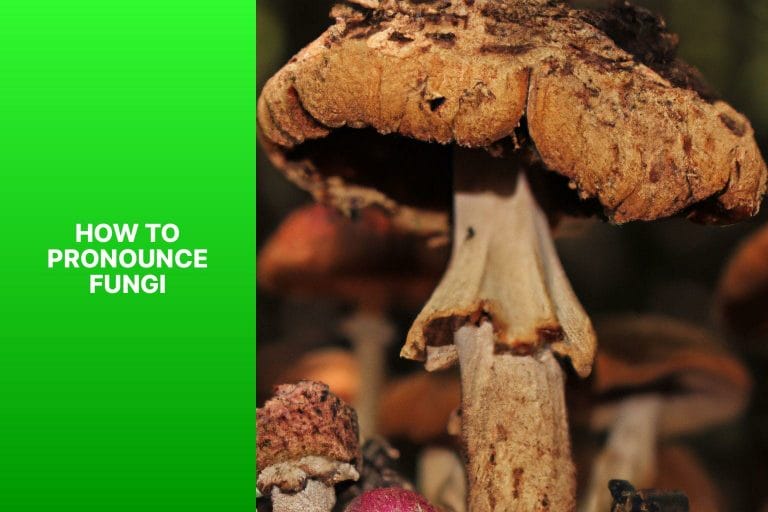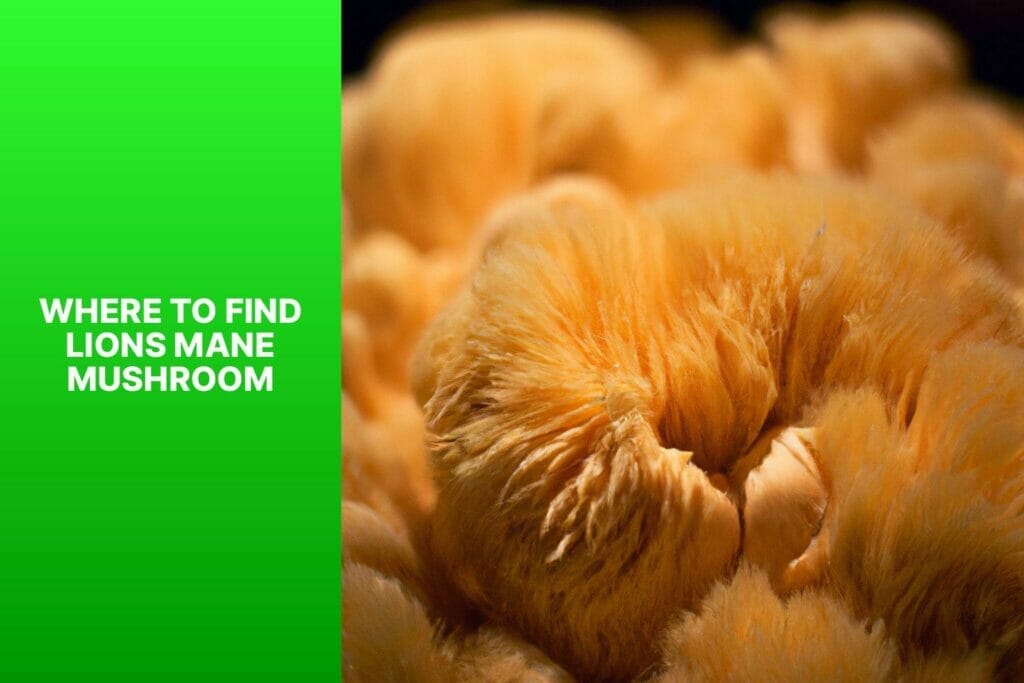Fungi, a diverse group of organisms that includes mushrooms, yeasts, and molds, are fascinating and important elements of the natural world. One aspect that often perplexes people is pronouncing the word “fungi.”
Pronunciation plays a crucial role in effective communication and understanding. In this article, we will explore the correct pronunciation of “fungi” and delve into common mispronunciations and their reasons.
Understanding how to pronounce “fungi” correctly will enhance your knowledge and contribute to clear and accurate communication in scientific and everyday conversations.
To effectively pronounce “fungi,” breaking down the word and understanding its phonetic pronunciation is essential. We will explore some commonly mispronounced fungal terms to expand your vocabulary and improve your pronunciation.
Key takeaway:
- Understanding the correct pronunciation of “fungi” is important for effective communication and credibility in academic and professional settings.
- The word “fungi” can be broken down phonetically as “fun-jai” or “fung-guy,” with an emphasis on the first syllable.
- Common mispronunciations of “fungi” include “fun-jee” and “fun-gee.”
- Mispronunciations may occur due to similarities with other words, such as “funny” or “fungus,” and confusion between spelling and pronunciation.
- To pronounce “fungi” correctly, breaking down the word and using a phonetic pronunciation guide is helpful.
- Other commonly mispronounced fungal terms include “mycelium” (mai-see-lee-um), “hyphae” (hi-fee), and “saprophyte” (sap-roh-fate).
Why is Pronunciation Important?
Pronunciation is important for communication. It helps convey messages accurately and clearly. Here are some reasons why it is important:
- Clarity: Pronouncing words correctly avoids confusion and miscommunication.
- Comprehension: Proper pronunciation improves listening comprehension.
- Professionalism: Clear and accurate pronunciation is crucial in professional settings and helps establish credibility.
- Meaning: Accurate pronunciation ensures that words are understood correctly.
- Fluency: Pronouncing words correctly enhances fluency in speaking.
- Confidence: Good pronunciation boosts confidence in speaking and improves communication skills.
How to Pronounce Fungi

Photo Credits: True2Mushrooms.Com by Daniel Clark
Are you confused about how to pronounce “fungi“? Don’t worry; I’ve got you covered! This section breaks down the word and provides a handy phonetic pronunciation guide. Plus, we’ll highlight some common mispronunciations to avoid. So, let’s dive in and master pronouncing “fungi” like a pro!
Breaking Down the Word
When breaking down the word “fungi,” it is important to understand its structure and pronunciation.
– The word “fungi” is a plural noun that refers to a group of organisms, including mushrooms, molds, and yeasts.
– It is derived from the Latin word “fungus,” meaning mushroom.
– In English, the word is pronounced as “FUN-guy” or “FUN-jee.”
The breakdown of the word “fungo” is as follows:
– The first syllable, “fun,” is pronounced with a short “u” sound, similar to “Sun.”
– The second syllable, “gi,” is pronounced as “gee,” rhyming with “tree.”
Understanding how to break down the word “fungi” can improve pronunciation and prevent common mispronunciations. Remember to stress the first syllable and pronounce the second syllable as “gee.”
Phonetic Pronunciation Guide
Here is a Phonetic Pronunciation Guide for the word “fungi.”
1. The first syllable of “fungi” is pronounced as “fun” with a short “u” sound, like “fun.”
2. The second syllable is pronounced as “guy” with a long “i” sound, like “buy.”
Putting these syllables together, the phonetic pronunciation of “fungi” is “fun-guy.”
It’s important to note that the “g” in “fungi” is pronounced as a soft “g” sound, like the “g” in “gentle.”
Following this Phonetic Pronunciation Guide, you can pronounce “fungi” correctly.
Common Mispronunciations
Fun-guy: Many people commonly mispronounce “fungi” as “fun-guy.” The correct pronunciation is “fun-guy.” Remember that “fungi” is the plural form of “fungus,” and the “i” at the end is pronounced like “eye.”
Fun-gee: Another mispronunciation that is frequently encountered is “fun-gee.” The correct pronunciation is “fun-guy,” emphasizing the first syllable.
Fun-gis: Some individuals mistakenly pronounce “fungi” as “fun-gis.” The correct pronunciation is “fun-guy,” with the “i” at the end pronounced like “eye.”
Foon-jee: Occasionally, you may come across the pronunciation “foon-jee” for “fungi.” The correct pronunciation is “fun-guy,” with the emphasis on the first syllable and the “i” at the end pronounced like “eye.”
Fun-geez: It is not uncommon for some individuals to mistakenly pronounce “fungi” as “fun-geez.” The correct pronunciation is “fun-guy,” with the “i” at the end pronounced like “eye.”
When encountering the word “fungi,” remember that it refers to a diverse group of organisms, including mushrooms, molds, and yeasts. Using the correct pronunciation of “fun-guy” ensures clear communication and an accurate understanding of this kingdom of living organisms.
Why Do People Mispronounce Fungi?
Why do people often stumble over the pronunciation of fungi? Let’s dive into the fascinating world of this curious word. We’ll explore the reasons behind the confusion, from the trap of similar-sounding words to the challenges posed by their spelling and pronunciation.
Get ready to uncover the secrets of fungi and understand why so many find it tricky to get it just right!
Similar-sounding Words
To correctly pronounce “fungi,” knowing similar-sounding words is important. Here are some examples:
| Similar-sounding Word | Correct Pronunciation |
|---|---|
| Fungus | /ˈfʌŋɡəs/ |
| Fungi | /ˈfʌŋɡaɪ/ |
| Fungus (plural) | /ˈfʌŋɡəsɪz/ |
| Fungi (plural) | /ˈfʌŋɡaɪz/ |
| Fungicide | /ˈfʌŋɡəsaɪd/ |
| Fungivorous | /fʌŋˈɡaɪvərəs/ |
“Distinguish between “fungus” and “fungi” as they have different meanings. “Fungus” refers to a singular organism. At the same time, “fungi” is the plural form. Similarly, “fungicide” is a substance used to kill or prevent the growth of fungi, and “fungivorous” describes organisms that feed on fungi.
Remember that the correct pronunciation of “fungi” is /ˈfʌŋɡaɪ/. By understanding the differences between similar-sounding words, you can ensure that you pronounce “fungi” accurately and avoid confusion.
Spelling and Pronunciation
Regarding spelling and pronunciation, it’s important to know the correct way to say “fungi.” Here are some key points to keep in mind:
1. Spelling: “Fungi” is spelled F-U-N-G-I. Use the correct spelling when referring to this term.
2. Pronunciation: “Fungi” is pronounced F-UH-N-J-I. The “UH” sound is like the sound in “but,” and the “J” sound is like the sound in “jam.”
3. Common Mispronunciation: A common mistake is replacing the “J” sound with a “G” sound, pronouncing it as F-UH-N-G-I. Avoid this mispronunciation and use the correct “J” sound.
Understanding the correct spelling and pronunciation of “fungi” is crucial for effective communication. By following these guidelines, you can confidently use and pronounce this term accurately in your conversations.
Tips for Correctly Pronouncing Fungi
Pronouncing fungi correctly can be challenging. Here are some tips to help you master it effortlessly.
- Break it down: Fungi is pronounced as FUN-guy. Emphasize the first syllable, which rhymes with “fun.”
- Practice with similar words: If you’re struggling, rehearse with words with similar sounds, such as “bungee” or “sponge.” This can help you get the hang of the “fun” sound in fungi.
- Pay attention to the “g”: The “g” in fungi is pronounced like a “j.” Think of the word “giraffe” to get the correct pronunciation.
- Speak slowly: Take your time when saying fungi. Pronouncing it too quickly can result in distorted sounds.
- Listen to examples: Look for audio clips or videos online demonstrating fungi’s correct pronunciation. Hearing it from native English speakers can be beneficial in acquiring the right sound.
Following these tips, you’ll confidently and correctly pronounce fungi in any conversation. Remember, practice makes perfect, so keep practicing until it becomes second nature.
Other Commonly Mispronounced Fungal Terms
Are you mispronouncing fungal terms? Not anymore! Let’s dive into the fascinating world of fungi and uncover the correct pronunciation of some commonly mispronounced terms.
In this section, we’ll demystify the pronunciation of three important fungal concepts: mycelium, hyphae, and saprophyte. Prepare to enhance your mycological vocabulary and impress your friends with your newfound expertise!
Mycelium
The mycelium is a vital part of fungi, playing a significant role in their growth and reproduction. It is a network of fine, thread-like structures called hyphae that form an extensive underground network.
The mycelium’s main function is absorbing nutrients from the surroundings, breaking down organic matter, and recycling nutrients into the ecosystem.
It acts as a feeding mechanism for the fungi, allowing them to obtain essential elements for growth and survival.
To understand the importance of mycelium, let’s examine a table outlining its key characteristics:
| Mycelium | Description |
|---|---|
| Composition | Network of hyphae |
| Function | Absorbs nutrients |
| Role | Facilitates growth and reproduction |
| Nutrient source | Breaks down organic matter |
| Structure | Fine, thread-like structures |
One remarkable story highlighting mycelium’s significance is the discovery of the “Wood Wide Web.” Scientists found that mycelium networks connect trees in symbiotic relationships, enabling communication and resource sharing.
This communication system helps trees send warning signals when pests attack or share nutrients with younger or weaker trees.
Understanding the role of mycelium in fungi is crucial for appreciating the complex nature and impact of these organisms in our ecosystem.
Hyphae
Hyphae are an important part of fungi. They are long, thread-like filaments that make up the mycelium. Hyphae have several functions in the life cycle of fungi.
To understand the structure of hyphae, refer to the table below:
| Hyphae Structure |
|---|
| Long and thin |
| Tubular |
| Branching |
| Thread-like |
Hyphae are long and thin, resembling tubes or fibers. Their branching structure helps them spread and grow to find nutrients. This branching allows fungi to colonize and extract nutrients from the environment.
Hyphae are vital for nutrient absorption. They secrete enzymes that break down organic matter into smaller substances that the fungus can absorb and use.
This ability to break down complex organic material allows fungi to thrive in diverse habitats, including soil, decaying matter, and other organisms’ surfaces.
Hyphae are essential for the reproductive process of fungi. They can produce reproductive structures like spores, which disperse the fungus to new areas.
Saprophyte
Saprophytes obtain nutrients from decaying organic matter. They are important for breaking down dead plants, animals, and other organic materials. Saprophytes can be found in forests, compost piles, and soil.
They contribute to nutrient cycling in ecosystems. Without them, the accumulation of dead matter would harm the environment.
A fallen tree, including saprophytic species, was covered in various fungi in one forest. These fungi quickly broke down the decaying wood and returned its nutrients to the soil.
This allowed other plants and organisms to thrive. Saprophytes are crucial for maintaining the balance of ecosystems.
Understanding the role of saprophytes and other organisms in nature can deepen our appreciation for the complex processes that occur in the natural world.
Some Facts About How To Pronounce “Fungi” in the English Language:
- ✅ The word “fungi” is the plural form of “fungus” and refers to eukaryotic organisms like mushrooms, yeasts, and molds. (Source: [pronounceitright. com](https://www.pronounceitright.com/pronunciation/fungi-us-8882))
- ✅ The Latin word “fungus,” meaning “mushroom,” is the root for the words “fungus” and “fungi.” (Source: [pronounceitright. com](https://www.pronounceitright.com/pronunciation/fungi-us-8882))
- ✅ In British English, the pronunciation of “fungi” is /ˈfʌŋ.ɡiː/. (Source: [Cambridge Dictionary](https://dictionary.cambridge.org/us/pronunciation/english/fungi))
- ✅ In American English, the pronunciation of “fungi” is /ˈfʌŋ.ɡaɪ/. (Source: [Cambridge Dictionary](https://dictionary.cambridge.org/us/pronunciation/english/fungi))
- ✅ The pronunciation of “fungi” can vary, and other pronunciations such as /ˈfʌndʒaɪ/ or /ˈfʌŋɡaɪ/ are also used. (Source: [wiktionary. org](https://en.wiktionary.org/wiki/fungi))


